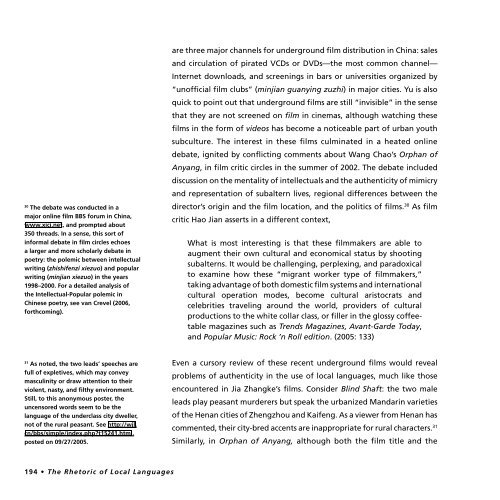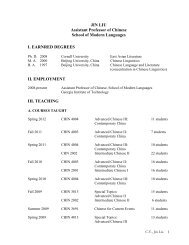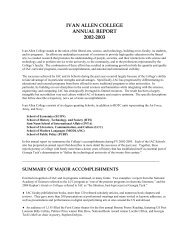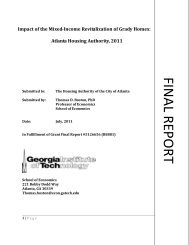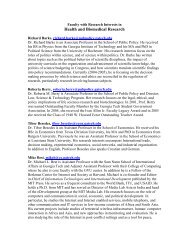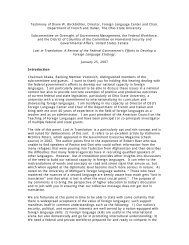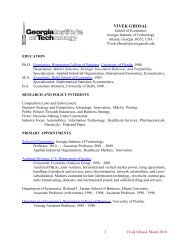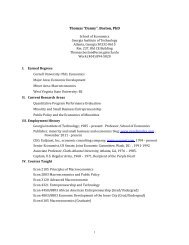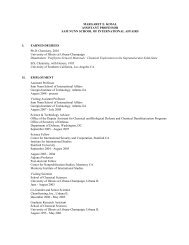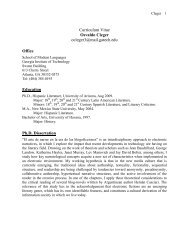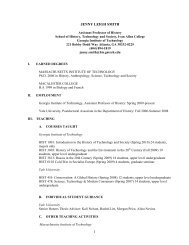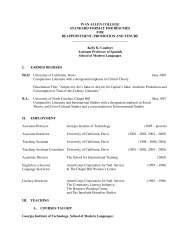Read this paper
Read this paper
Read this paper
You also want an ePaper? Increase the reach of your titles
YUMPU automatically turns print PDFs into web optimized ePapers that Google loves.
30<br />
The debate was conducted in a<br />
major online film BBS forum in China,<br />
www.xici.net, and prompted about<br />
350 threads. In a sense, <strong>this</strong> sort of<br />
informal debate in film circles echoes<br />
a larger and more scholarly debate in<br />
poetry: the polemic between intellectual<br />
writing (zhishifenzi xiezuo) and popular<br />
writing (minjian xiezuo) in the years<br />
1998–2000. For a detailed analysis of<br />
the Intellectual-Popular polemic in<br />
Chinese poetry, see van Crevel (2006,<br />
forthcoming).<br />
are three major channels for underground film distribution in China: sales<br />
and circulation of pirated VCDs or DVDs—the most common channel—<br />
Internet downloads, and screenings in bars or universities organized by<br />
“unofficial film clubs” (minjian guanying zuzhi) in major cities. Yu is also<br />
quick to point out that underground films are still “invisible” in the sense<br />
that they are not screened on film in cinemas, although watching these<br />
films in the form of videos has become a noticeable part of urban youth<br />
subculture. The interest in these films culminated in a heated online<br />
debate, ignited by conflicting comments about Wang Chao’s Orphan of<br />
Anyang, in film critic circles in the summer of 2002. The debate included<br />
discussion on the mentality of intellectuals and the authenticity of mimicry<br />
and representation of subaltern lives, regional differences between the<br />
director’s origin and the film location, and the politics of films. 30 As film<br />
critic Hao Jian asserts in a different context,<br />
What is most interesting is that these filmmakers are able to<br />
augment their own cultural and economical status by shooting<br />
subalterns. It would be challenging, perplexing, and paradoxical<br />
to examine how these “migrant worker type of filmmakers,”<br />
taking advantage of both domestic film systems and international<br />
cultural operation modes, become cultural aristocrats and<br />
celebrities traveling around the world, providers of cultural<br />
productions to the white collar class, or filler in the glossy coffeetable<br />
magazines such as Trends Magazines, Avant-Garde Today,<br />
and Popular Music: Rock ’n Roll edition. (2005: 133)<br />
31<br />
As noted, the two leads’ speeches are<br />
full of expletives, which may convey<br />
masculinity or draw attention to their<br />
violent, nasty, and filthy environment.<br />
Still, to <strong>this</strong> anonymous poster, the<br />
uncensored words seem to be the<br />
language of the underclass city dweller,<br />
not of the rural peasant. See http://wjl.<br />
cn/bbs/simple/index.php?t15241.html,<br />
posted on 09/27/2005.<br />
Even a cursory review of these recent underground films would reveal<br />
problems of authenticity in the use of local languages, much like those<br />
encountered in Jia Zhangke’s films. Consider Blind Shaft: the two male<br />
leads play peasant murderers but speak the urbanized Mandarin varieties<br />
of the Henan cities of Zhengzhou and Kaifeng. As a viewer from Henan has<br />
commented, their city-bred accents are inappropriate for rural characters. 31<br />
Similarly, in Orphan of Anyang, although both the film title and the<br />
194 • The Rhetoric of Local Languages<br />
MCLC 18.2.indd 194<br />
12/20/06 2:01:40 PM


